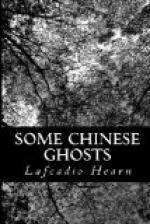Five hundred years ago, in the reign of the Emperor Houng-Wou, whose dynasty was Ming, there lived in the City of Genii, the city of Kwang-tchau-fu, a man celebrated for his learning and for his piety, named Tien-Pelou. This Tien-Pelou had one son, a beautiful boy, who for scholarship and for bodily grace and for polite accomplishments had no superior among the youths of his age. And his name was Ming-Y.
Now when the lad was in his eighteenth summer, it came to pass that Pelou, his father, was appointed Inspector of Public Instruction at the city of Tching-tou; and Ming-Y accompanied his parents thither. Near the city of Tching-tou lived a rich man of rank, a high commissioner of the government, whose name was Tchang, and who wanted to find a worthy teacher for his children. On hearing of the arrival of the new Inspector of Public Instruction, the noble Tchang visited him to obtain advice in this matter; and happening to meet and converse with Pelou’s accomplished son, immediately engaged Ming-Y as a private tutor for his family.
Now as the house of this Lord Tchang was situated several miles from town, it was deemed best that Ming-Y should abide in the house of his employer. Accordingly the youth made ready all things necessary for his new sojourn; and his parents, bidding him farewell, counselled him wisely, and cited to him the words of Lao-tseu and of the ancient sages:
“By a beautiful face the world is filled with love; but Heaven may never be deceived thereby. Shouldst thou behold a woman coming from the East, look thou to the West; shouldst thou perceive a maiden approaching from the West, turn thine eyes to the East.”
If Ming-Y did not heed this counsel in after days, it was only because of his youth and the thoughtlessness of a naturally joyous heart.
And he departed to abide in the house of Lord Tchang, while the autumn passed, and the winter also.
* * * * *
When the time of the second moon of spring was drawing near, and that happy day which the Chinese call Hoa-tchao, or, “The Birthday of a Hundred Flowers,” a longing came upon Ming-Y to see his parents; and he opened his heart to the good Tchang, who not only gave him the permission he desired, but also pressed into his hand a silver gift of two ounces, thinking that the lad might wish to bring some little memento to his father and mother. For it is the Chinese custom, on the feast of Hoa-tchao, to make presents to friends and relations.
That day all the air was drowsy with blossom perfume, and vibrant with the droning of bees. It seemed to Ming-Y that the path he followed had not been trodden by any other for many long years; the grass was tall upon it; vast trees on either side interlocked their mighty and moss-grown arms above him, beshadowing the way; but the leafy obscurities quivered with bird-song, and the deep vistas of the wood were glorified by




